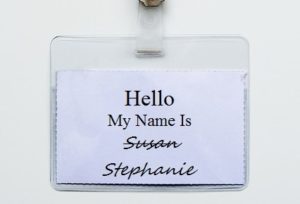
Many years ago, when I started my first job after college, I noticed that a lot of people who had been with the company for a while called me Susan—but my name is Stephanie. I couldn’t figure out what was going on until one day, some months later, when I met a lady in another office who had been there for a while and who had the same last name as me. And her first name was—you guessed it—Susan. Since we had the same last name, and both our first names started with S, it was completely understandable why people would mix us up.
The commonly confused words we’ll look at today are a lot like that. You may remember that last time we considered homophones—that is, words that sound alike, even though they have different spellings and meanings. So now let’s widen our scope a little more and examine pairs or groups of words that are close in sound and sometimes meaning as well. You could think of these as close—but not quite.
adverse/averse – This is a pair that is very close indeed…but not the same. Adverse, meaning “hostile,” “unfavorable,” or “harmful,” describes an objective quality that anyone can observe. Averse, however, refers to a person’s subjective feeling of dislike or distaste.
Examples:
Some prescription drugs unfortunately have adverse side effects, such as weight gain or nausea. (Everyone can observe these undesirable side effects.)
As a result, many people grow averse to the idea of using them. (Now we’re describing an emotional reaction.)
affect/effect – Oh my goodness, does this pair give me headaches! And I know I’m not alone. I wish I had a nickel for every time I’ve looked these two up. But here’s a good starting point for sorting them out: affect is usually a verb—“to produce an influence upon or alteration in”—while effect is usually a noun—”a change that results when something is done or happens.”
Examples:
Everyone knows that your mood can dramatically affect your performance at work. (Affect is a verb.)
Mark’s cheerful attitude always has a good effect on his co-workers. (Effect is a noun.)
assure/ensure/insure – It’s easy to understand why this group causes confusion, because they all basically mean “to make a thing or person certain.” The easiest one to distinguish is assure, because it implies a 100% guarantee. Ensure often carries a connotation of a guarantee as well, although not quite as strong as assure. Of all the words in the group, insure has the least feeling of guarantee; instead, it usually implies that some sort of preparation or precaution must be taken beforehand. So that’s why we insure a car or a house: we have to make the preparation of giving a little money to a company who will (hopefully) pay off if we end up in a situation where we need a lot of money. To keep things simple, I’ve always gone along with the advice you’ll find in some style guides: to use insure only in financial contexts and ensure more generally (this is what I’ve done in the examples below). You can’t go wrong that way.
Examples:
The movers assured us that our heirloom china closet would not be damaged in the move. (They gave us their guarantee.)
But just to be on the safe side, we ensured that it was well packed. (We checked how they packed it to make ourselves feel better.)
And we insured it for its replacement value. (We called our insurance company and added a rider to our homeowner’s policy.)

collaborate/corroborate – Finally, a pair that’s easier to distinguish because they have very different meanings. But they still sound enough alike to cause confusion. Collaborate means “to work together,” “to cooperate,” while corroborate means “to support with evidence,” “to make more certain.”
Examples:
Scientists often collaborate on important studies.
The results of those studies sometimes corroborate the preliminary results of earlier studies.
elicit/illicit – These two also sound similar but have very different meanings. And wait, there’s more—elicit is a verb: “to call out” or “to bring forth.” But illicit is an adjective: “unlawful, illegal.”
Example:
Engaging in illicit (illegal) activites such as drug trafficking will elicit (bring forth) a response from the authorities.
farther/further – There’s an interesting backstory to this pair. You might be familiar with the common rule of thumb that farther is used in contexts expressing distance, while further expresses addition. So far so good—but according to Merriam-Webster Online, previously they were almost synonymous. The distinction we now tend to make between the two is a relatively recent development in English usage.
Example:
The rest stop is ten miles farther down the road. (distance)
You don’t have to convince me any further to stop there—I need coffee! (addition)
stanch/staunch – This pair is much like elicit/illicit that we discussed above: they are quite similar in sound, yet very different in meaning. And like elicit, stanch is a verb: “to check or stop a flow;” “to check or stop the course.” But staunch, like illicit, is an adjective: “steadfast, faithful, loyal.”
Examples:
Someone please help me stanch the bleeding from this cut!
Oh, thank you for helping me—you are indeed a staunch friend!

I hope I haven’t worn you out too much, because our last pair for the day, flaunt/flout, is somewhat controversial. Wait, what—controversy in grammar? Yes, believe it or not. Here’s the traditional distinction between the two: flaunt means “to show off,” but flout means “to treat with contempt.” So you could say something like The woman flaunted (showed off) her beautiful body by wearing revealing clothes, and flouted (treated with contempt) the rules of propriety by having numerous affairs.
However, flaunt has also been used in the same way as flout—”to treat with contempt”—so much since at least the 1940s that some authorities now concede that this usage is not necessarily wrong. And chances are good that if you do a fair amount of reading, you’ve come across this yourself, most likely in a phrase such as to flaunt the rules (whereas traditionally it should be flout). But most style guides still recommend preserving the distinction, especially in more formal writing.
In my research of this dispute, I came across a great mnemonic for this one on the Grammar Girl website (which I highly recommend): to remember that flout is the one that involves ignoring rules, connect the out in flout to outlaw or being outside society.
By now you know the drill: besides these pairs of easily confused words, there are many more out there. So if you’re ever in doubt whether you’re using the correct one, look it up. You might find, as with flaunt and flout, that in some cases there are differences of opinion on acceptable usage. When you encounter controversy, it helps to consult more than one source. You also have to keep in mind that some dictionaries merely document how language is used: their inclusion of a particular word or definition doesn’t necessarily mean that it’s good usage. Your goal should always be clear, concise writing that leaves no possibility that you’ll be misunderstood.
So enough philosophizing! Are there any other close-but-not-quite pairs that often trip you up? Have you ever seen any of these used incorrectly in published writing? (Once you start looking, you’ll find them!) Please feel free to share them below!
